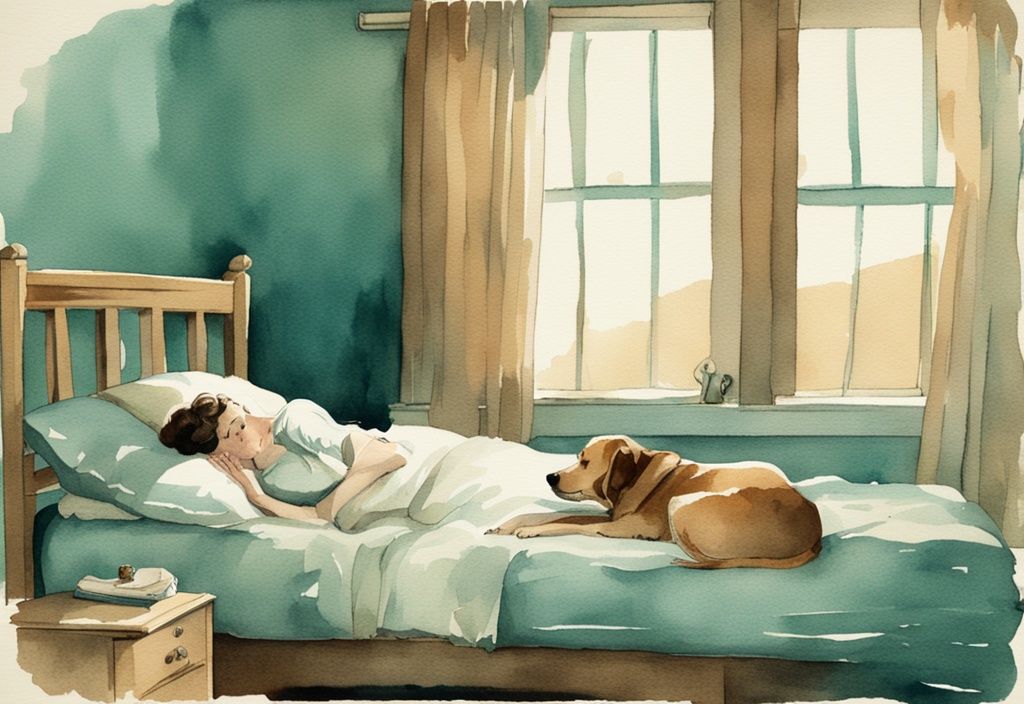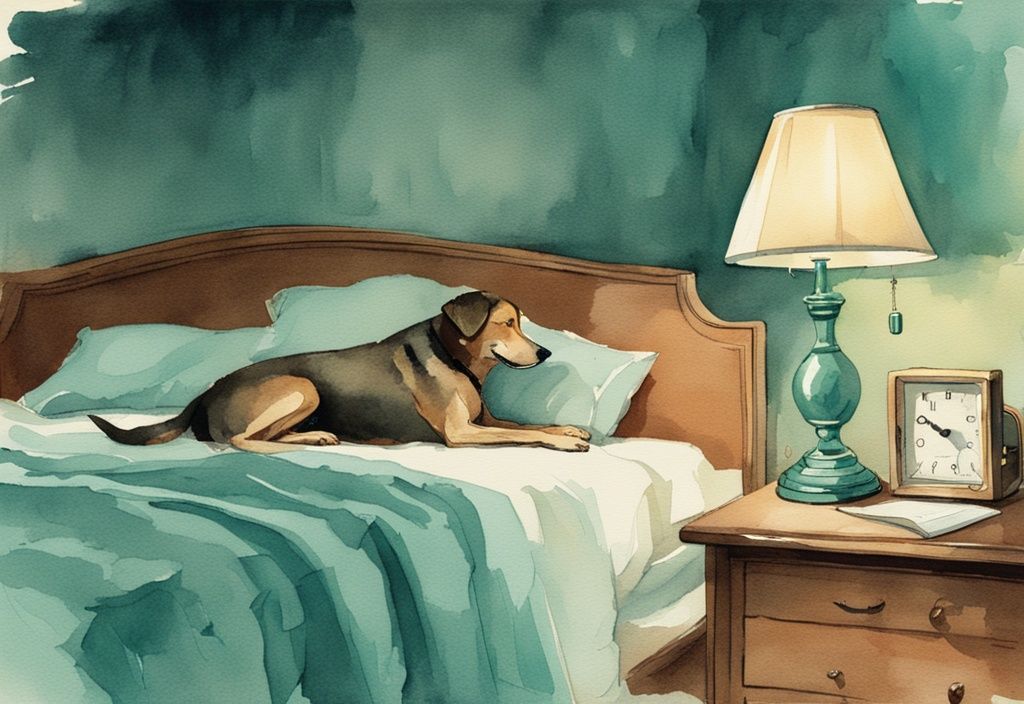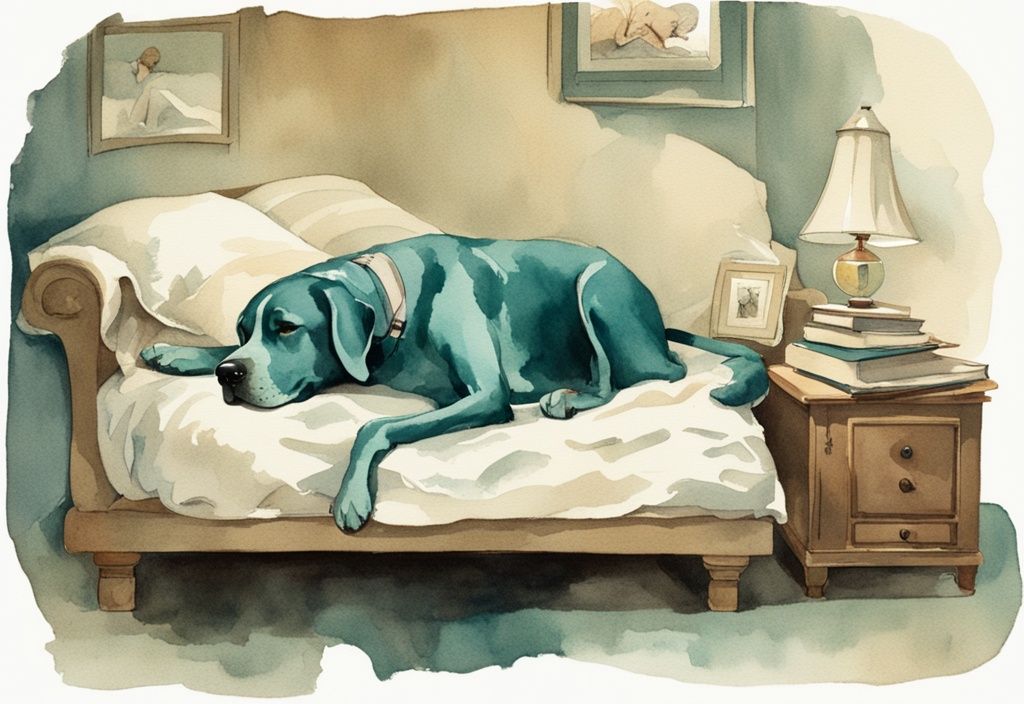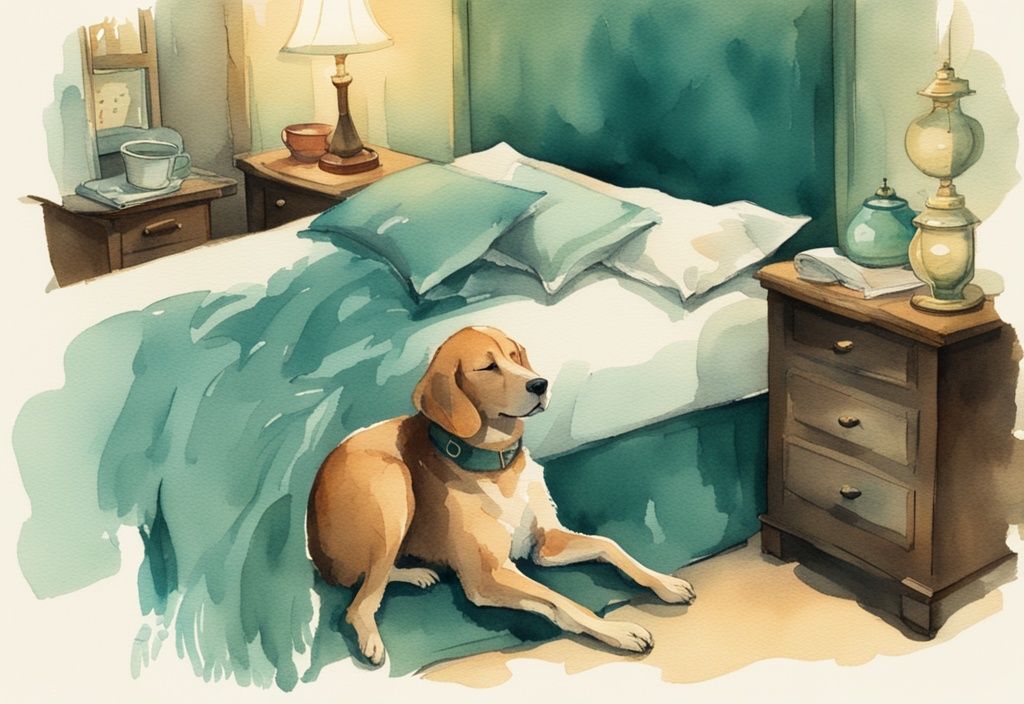Has your dog been howling in his sleep, leaving you unheard and worried? It’s not an uncommon scenario, but what does it really mean? As a doting dog mom myself, I too have experienced these late-night serenades and the concern that comes with them. Hence, I turned my worry into a bee-line for answers.
In this enlightening read, we’ll dispel your worries by investigating the reasons behind our four-legged companions’ nocturnal howling. Does dreaming inspire it? Is it an instinctual behavior, or perhaps, a sign of a deeper medical problem? Understanding why your dog might be howling during sleep does more than just satisfy your curiosity—it helps ensure their well-being. To further enhance your knowledge of canine communication, it’s essential to recognize how your dog’s body language plays a role in their emotions and intentions. You can learn more about this by visiting this resource on dog body language.
So stick with me, as we explore this intriguing dog behavior together, shedding light on when to enjoy the nighttime serenade, and when to consult your vet.
Reasons Your Dog Might be Howling in Their Sleep
Understanding Sleep Howling as a Form of Canine Communication
Dogs often use howling as a fundamental form of communication, expressing a variety of emotions or reacting to certain sounds. Just as they howl while awake, this behavior can carry over into their dream state, manifesting as sleep howling. When wondering “why is my dog howling in his sleep,” consider that your dog might be dreaming of scenarios where they are part of a pack, engaging in social communication, or feeling isolated and calling for help.
Impact of REM Sleep and Dreams on Dog Howling
During Rapid Eye Movement (REM) sleep, dogs experience high levels of brain activity similar to humans. This stage of sleep is when dreaming occurs, and your dog may vocalize or move. Sleep howling can be a direct result of these dreams. Often, these dreams include instinctual activities such as howling with a pack or responding to perceived threats. Just like humans who talk in their sleep, dogs might express themselves vocally when they reach this deep stage of rest.
Environmental and Emotional Factors Leading to Sleep Howling
Various environmental and emotional stressors can influence a dog’s dream content, leading to sleep howling. Anxiety or fear can play a significant role in eliciting such behavior. Changes in the environment or disturbances can heighten a dog’s stress levels, subsequently causing sleep disturbances like howling. Rescue dogs or those with traumatic past experiences might be more prone to this behavior, as they relive past stresses and fears during their dreams. Additionally, dogs suffering from separation anxiety might howl in their sleep if they are used to being close to their owners and experience sudden separation.
Medical Conditions That Could Cause Your Dog to Howl While Sleeping
Medical issues are another critical aspect to consider when pondering “why is my dog howling in his sleep.” Conditions such as Canine Cognitive Decline, akin to dementia in humans, can cause significant disruptions in a dog’s sleep patterns, leading to howling. Chronic pain from ailments like arthritis can also be a trigger.
Sudden and frequent sleep howling that seems particularly anxious can sometimes indicate underlying health issues such as pain, anxiety, or neurological disorders. Furthermore, sleep disorders like insomnia or sleep apnea in dogs can contribute to this behavior, warranting a closer examination and potentially a consultation with a veterinarian.

Is Your Dog’s Sleep Howling Normal or a Cause for Concern?
How to Differentiate Between Normal and Abnormal Sleep Howling
Understanding why your dog is howling in his sleep can be both a puzzling and endearing aspect of pet ownership. Normal sleep howling is typically infrequent and not bothersome to your furry friend. This kind of howling tends to happen during REM sleep, a phase when dogs are dreaming and their brains are more active. So, if the howling is occasional and your dog seems untroubled, it’s likely a natural part of his nocturnal adventures.
Now, if the howling suddenly ramps up in frequency or seems to stress your dog out, it might be a bit more concerning. Keep an eye out for howling that starts unexpectedly and frequently, or if your dog acts uncomfortable or distressed while howling. Changes in the environment, like a new home or an altered routine, can also trigger this behavior. By keeping tabs on when and how often your dog howls, you’ll get a clearer picture of whether there’s a bigger issue at play, stressing the importance of figuring out why your dog is howling in his sleep.
Identifying and Addressing Dog Breeds Prone to Howling
The melody of howling can be more common in certain breeds due to their wolfish ancestry. Breeds like Huskies and Beagles are naturally more vocal and might serenade you both day and night. Knowing your dog’s breed is key to distinguishing between instinctive and potentially problematic howling. For pet owners considering dietary changes, check out our comprehensive review of Badlands Ranch dog food to ensure you’re meeting your furry friend’s nutritional needs. So, if you’re the proud parent of a vocal breed, some howling—yes, even in sleep—should be part of the expected soundtrack.
Even so, context matters. If your Husky’s howling seems overly frequent or distressed, further investigation might be needed. But a Beagle’s occasional dreamy howl can often be chalked up to natural nocturnal chatter. Understanding why your dog is howling in his sleep based on breed can help you manage your expectations and address any worries appropriately.
When to Consult a Veterinarian About Your Dog’s Sleep Howling
There are moments when a vet’s insight becomes crucial, especially if the sleep howling is both frequent and intense, or is paired with signs of distress or health issues. Persistent nocturnal disruptions could hint at underlying problems like anxiety, chronic pain, or neurological disorders. Prompt action here is essential to nip any potential issues in the bud.
If your dog’s sleep howling goes hand in paw with anxiety, pain, or odd behaviors, it’s time to seek professional advice. Chronic or highly distressing howling needs a vet’s evaluation to rule out or diagnose any underlying health conditions. Your vet can offer valuable insights into potential causes and suggest solutions, whether it’s through behavior modification, changes in the environment, or medical intervention. Getting to the bottom of why your dog is howling in his sleep ensures your furball’s wellbeing and your peace of mind.
Steps to Manage and Alleviate Your Dog’s Sleep Howling
Creating a calm, secure, and cozy environment for your furry friend can dramatically impact how they sleep and help reduce sleep howling.
Creating a Stress-Free and Comfortable Sleep Environment for Your Dog
Imagine your dog curling up in a snug, peaceful corner—it’s the perfect setting for a good night’s sleep. Keep the space calm by ensuring it’s free from sudden noises and disruptions. A plush bed that supports your dog’s body can work wonders too. Don’t forget to make the area dimly lit or dark. A serene sleeping environment nurtures better sleep quality and may reduce those heart-wrenching nighttime howls.
Establishing a Calming Bedtime Routine for Your Howling Dog
Establishing a nightly ritual is like giving your dog a comfort blanket. Think of gentle petting, a quiet session of bonding, or some soft background music. These small actions can imbue a sense of security. Keeping the routine consistent is crucial—your dog will get the signal that it’s bedtime, easing their anxiety and ideally preventing that mournful sleep howling. It’s like tucking them in with love and assurance every night.

The Role of Adequate Exercise and Mental Stimulation in Preventing Howling
Exercise isn’t just for burning off energy; it’s also essential for emotional well-being. Regular walks, playtime, or even a good romp in the yard can alleviate stress and anxiety. Keep their minds busy too—interactive toys, puzzles, or new tricks can be fulfilling. When your dog is both physically and mentally satisfied, they’re more likely to drift into a restful slumber, leaving those howls behind.
Medications That Can Help – What to Know and When to Use Them
Sometimes, despite our best efforts, professional help is needed. If your dog’s sleep howling persists, a vet visit is in order. They might suggest calming medications or treatments for underlying health issues. For a more natural route, look into options like melatonin or CBD products, but always consult your vet first. Consider medication as a last resort, after you’ve exhausted environmental and routine adjustments, always prioritizing your dog’s health and safety.
Conclusion
Why is my dog howling in his sleep? This question resonates with many dog owners, and understanding the reasons is crucial. Sleep howling can be part of a dog’s instinctual behavior, linked to their dreams and natural communication tendencies. However, it’s essential to recognize when this behavior might indicate deeper issues.
It’s common for a dog to howl during sleep as part of the normal dreaming process. But sometimes, this behavior could signal underlying medical or psychological problems. For example, Canine Cognitive Decline, chronic pain, or emotional stress could be the cause. Distinguishing between usual and concerning howling involves observing patterns of frequency and intensity and noting any additional symptoms of distress.
Creating a comfortable, stress-free sleeping environment for your dog is paramount. Regular routines and adequate exercise can help mitigate anxiety-related howling. If concerns persist, seeking professional advice from a veterinarian is recommended. This ensures that any potential health issues are addressed promptly, providing peace of mind and better sleep quality for both you and your furry friend.
Maintaining awareness and taking proactive measures can make a substantial difference in your dog’s well-being. Recognizing why your dog might be howling in his sleep and when it’s time to take action will help you ensure a healthier and happier life for your pet.
Frequently Asked Questions About Dog’s Sleep Howling
Is it normal for dogs to howl in their sleep?
Absolutely, it’s usually normal! Think of it like humans talking in their sleep. This magical moment often happens during REM sleep, a dream-filled phase when dogs have a whirlwind of brain activity. My own Labrador, Max, sometimes lets out a soft howl, and it always makes me wonder what he’s dreaming about. Probably chasing squirrels.

What could cause sudden sleep howling in older dogs?
Sudden sleep howling in our wiser, older dogs can happen due to a few reasons. It might be Canine Cognitive Decline or a decline in sensory processing. Chronic pain or just the increased anxiety that sometimes comes with age can also spur those nightly howls. Remember, they might need a bit of extra comfort as they age.
How can I reduce my dog’s anxiety that’s causing sleep howling?
Here are a few tips to help your furry friend sleep more peacefully:
- Create a cozy, stress-free sleeping nook for your dog.
- Establish a calming bedtime routine. Maybe a gentle belly rub can be a part of it—my Cocker Spaniel, Bella, loves hers!
- Ensure your pup gets plenty of exercise and mental stimulation during the day. A tired dog is a happy dog, after all.
- Consult with your vet about anxiety-reducing options, which might include medications or supplements.
Reducing anxiety can turn those howling nights into sweet, dreamy slumbers.
When should I consult a vet for my dog’s sleep howling?
If your dog’s howling becomes more frequent, intense, or comes with signs of distress or other health issues, it’s time to see the vet. Chronic howling that causes noticeable distress or pairs with symptoms like pain, anxiety, or unusual behaviors is a clear call for professional advice.
I once rushed Pepper, my Golden Retriever, to the vet when her howling became a nightly ordeal, only to find out she had a minor but chronic pain issue. The vet’s guidance made all the difference.
